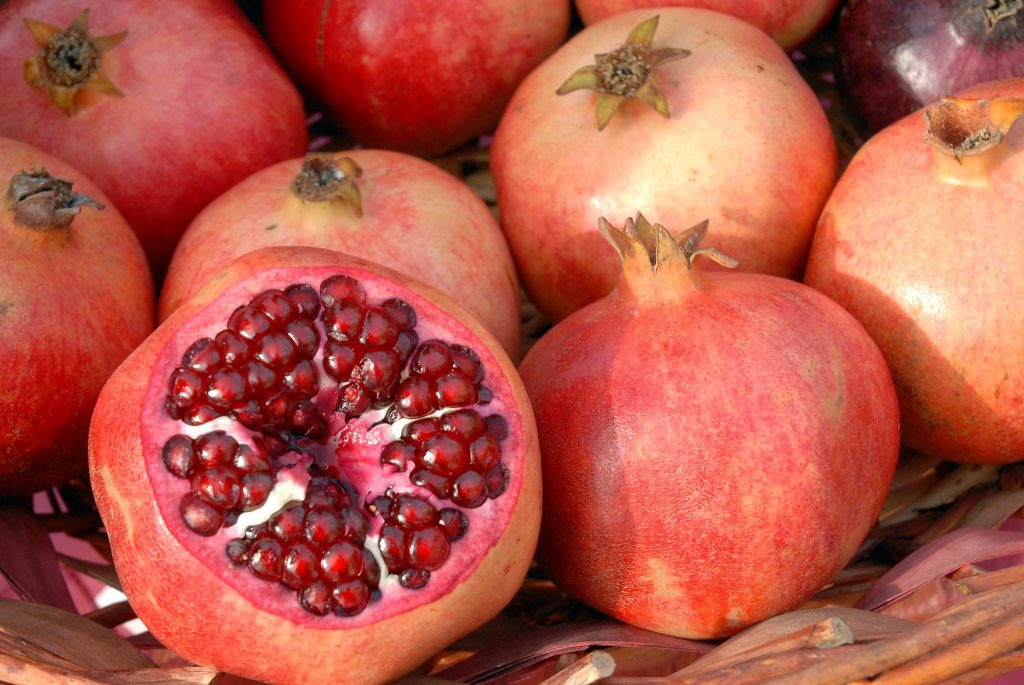
Pomegranate extracts inhibit the growth of breast, prostate, colon and lung cancer cells in culture. In animal studies, oral consumption of pomegranate extract inhibited growth of lung, skin, colon and prostate tumors. Pomegranate extract (Punica granatum L.), has promise as a treatment against breast cancer by preventing proliferation of cancer stem cells. A standardized extract of pomegranate (PE) on a mouse mammary cancer cell line (designated WA4), which contains a majority of cells possessing stem cell characteristics, inhibited the proliferation of WA4 cells in a time- and concentration-dependent manner. This was due to an arrest of cell cycle progression in the G0/G1 phase. Pomegranate extract treatment of WA4 cells resulted in an increase in caspase-3 enzyme activity in a time- and concentration-dependent manner, indicating that the cytotoxic effect of PE was due to the induction of apoptosis. The phytochemicals ellagic acid, ursolic acid and luteolin caused a time- and concentration-dependent reduction of cell proliferation and viability, suggesting that they contribute to the inhibitory effect of pomegranate extract. Cancer stem cells, which are highly resistant to conventional chemotherapeutic agents, are thought to be the origin of both primary and secondary breast tumors, and are a critical target in both breast cancer therapy and prevention.
Various constituents of pomegranates can inhibit aromatase and 17 beta-hydroxysteroid dehydrogenase enzymes or have antiestrogenic activity. Pomegranate contains a group of phytochemicals called ellagitannins. Several of these, including ellagic acid, gallagic acid, and urolithins A and B, inhibit aromatase activity and testosterone-induced breast cancer cell proliferation, with urothilin B being most effective. Pomegranate extract is also a selective estrogen receptor modulator, able to induce ERalpha and ERbeta mRNA expression in MCF-7 cells.
Pomegranate seed oil contains punicic acid, an omega-5 long chain polyunsaturated fatty acid that inhibited proliferation of estrogen positive and estrogen negative breast cancer cells in laboratoy studies by over 90%. Punicic acid caused cell death (apoptosis) in ER negative and ER positive breast cancer cells by 86 and 91%, respectively compared to untreated control cells. Punicic acid has breast cancer inhibitor properties that are dependent on lipid peroxidation and the PKC pathway.
The aqueous PFE dose-dependently inhibited NF-kB-dependent reporter gene expression associated with proliferation, invasion, and motility in aggressive breast cancer phenotypes while decreasing RhoC and RhoA protein expression. Pomegranate extracts also demonstrate the ability to inhibit angiogenesis, or block the formation of a blood supply to breast cancer tumours, slowing down their growth.
Pomegranate extracts and genistein (from soy) inhibit the growth of MCF-7 breast cancer cells through induction of apoptosis, with combination treatment being more effective than either treatment alone.
The ability to block estrogen production was shown by polyphenols from fermented pomegranate juice, pomegranate peel, and oil, which inhibited aromatase activity by 60-80%. Fermented juice and pericarp polyphenols, and whole seed oil, inhibited 17-beta-hydroxysteroid dehydrogenase Type 1 from 34 to 79%, at concentrations ranging from 100 to 1,000 microg/ml according to seed oil >> fermented juice polyphenols > pericarp polyphenols. The seed oil had the strongest effect. In a yeast estrogen screen lyophilized fresh pomegranate juice effected a 55% inhibition of the estrogenic activity of 17-beta-estradiol; whereas the lyophilized juice by itself displayed only minimal estrogenic action. Inhibition of cell lines by fermented juice and pericarp polyphenols was according to estrogen-dependent (MCF-7) >> estrogen-independent (MB-MDA-231) > normal human breast epithelial cells (MCF-10A). In both MCF-7 and MB-MDA-231 cells, fermented pomegranate juice polyphenols consistently showed about twice the anti-proliferative effect as fresh pomegranate juice polyphenols. Therefore, when using promegrantae juice, it should be fermented for greater effectiveness. Pomegranate seed oil effected 90% inhibition of proliferation of MCF-7 at 100 microg/ml medium, 75% inhibition of invasion of MCF-7 across a Matrigel membrane at 10 microg/ml, and 54% apoptosis in MDA-MB-435 estrogen receptor negative metastatic human breast cancer cells at 50 microg/ml. In a murine mammary gland organ culture, fermented juice polyphenols effected 47% inhibition of cancerous lesion formation induced by the carcinogen 7,12-dimethylbenz[a]anthracene (DMBA).
- Pomegranate extract inhibits the proliferation and viability of MMTV-Wnt-1 mouse mammary cancer stem cells in vitro.
- Cancer chemoprevention by pomegranate: laboratory and clinical evidence.
- Pomegranate and breast cancer: possible mechanisms of prevention.
- Pomegranate (Punica granatum) seed linolenic acid isomers: concentration-dependent modulation of estrogen receptor activity.
- Pomegranate ellagitannin-derived compounds exhibit antiproliferative and antiaromatase activity in breast cancer cells in vitro.
- Punicic acid is an omega-5 fatty acid capable of inhibiting breast cancer proliferation.
- Anticancer activities of pomegranate extracts and genistein in human breast cancer cells.
- Preliminary studies on the anti-angiogenic potential of pomegranate fractions in vitro and in vivo.
- Chemopreventive and adjuvant therapeutic potential of pomegranate (Punica granatum) for human breast cancer



